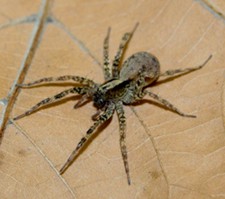
When Food Is Scarce, Hungry Female Spiders Alter Mating Preferences
New research from the University of Cincinnati provides food for thought.
The research examined how short-term and long-term hunger affected mate selection and aggression in female wolf spiders (Schizocosa ocreata) commonly found in the eastern United States and Canada. These female spiders are potentially aggressive and cannibalistic when approached by a courting male.
The research is published in the April 2011 print issue of the journal, Animal Behavior. It was carried out by George Uetz, UC professor of biology, and former UC doctoral student Brian Moskalik, now a postdoctoral teaching fellow at College of the Holy Cross, Worcester, Mass.
According to Uetz, this research helps indicate what might result if environmental changes affect food resources for animal populations, shedding light on the possible effects of scarce resources on short- and long-term mating preferences and potential long-term population dynamics.
He added, For instance, we had a drought this past summer, and we saw smaller spiders in the fall. This spring, were getting a lot of rain, which will likely mean more insects and an abundant food supply for spiders. That should mean well-fed spiders this year and, according to our research, that will affect spider mating choices.
SATIATED (WELL-FED) FEMALE SPIDERS
Hunger does affect female spiders receptivity to mating, with well-fed females showing the most overall receptivity to mate and the least aggression. These satiated females were, however, quite choosy, and were most receptive to large-bodied males with large leg tufts (an indication of success in foraging for food). As they aged, they showed lower levels of aggression, and that aggression was directed toward small-bodied males with small leg tufts.
SHORT-TERM STARVATION
Overall, female spiders that experienced short-term starvation showed relatively little receptivity to mating and higher levels of aggression. The aggression was strongest toward small-bodied males with shorter leg tufts. This aggression was seen in these females both shortly after maturation and as they aged.
However, as these females aged, they increased their receptivity to mate with large-bodied males.
LONG-TERM STARVATION
Early in adulthood, female spiders that experience long-term starvation were most receptive to mating with large-bodied males regardless of the size of leg tufts of hair. At the stage of early maturation, however, they were extremely aggressive toward small-bodied males.
As these females aged, they continued to show preference for large-bodied males, especially those with large leg tufts. While aggression toward small-bodied males continued, it decreased in intensity.
CONCLUSION
In general, large-bodied males with large leg tufts were the most preferred by both satiated and hungry females. They were also less likely to be cannibalized, thus in all probability increasing the population of attractive, high-quality males.
These results suggest that hungry females are making a trade-off, mating with preferred males and eating the less-desirable ones,
said Uetz.
Said Moskalik, Still, a general trend apparent in the results suggests that as unmated female spiders age, they become less aggressive. So, males that are typically unattractive to females when those female are early in the maturation period may be given mating opportunities as the female population ages.
To control for differences in male behavior, the UC researchers used video playback with digitized courting males in their experiments. The males size and indicator traits (leg tufts) were altered to reflect either large size and good condition or to reflect poorly fed smaller males.
Funding for this research was provided by the National Science Foundation, the American Arachnological Society and the University of Cincinnati, with support from the Cincinnati Nature Center.
Related Stories
Cincinnati Enquirer: UC students win Flying Pig races
May 6, 2024
University of Cincinnati students won championships in the 2024 Flying Pig Marathon, including the women's marathon and men's and women's half marathons, the Cincinnati Enquirer reported.
Information Security Roadshow spreads awareness
May 3, 2024
The University of Cincinnati's Office of Information Security launched a series of 18 in-person sessions from January to April 2024, drawing nearly 350 attendees from the staff of various UC colleges and units. The Information Security Roadshow series aimed to equip the audience with knowledge on prevailing cyber threats, prevention strategies, how to report incidents and resources to stay informed and secure.
UC alum makes her mark in research, service
May 3, 2024
In 1960, as a young and eager statistician, Joan Reisch graduated from UC’s College of Arts and Sciences, and pursued a career in Texas at the Southwestern Medical Center where she’s held numerous roles as both faculty and staff. This year, Reisch was recognized for her career accomplishments and contributions with the Philanthropist of the Year Award by UC’s Alumni Association. This award is given to an alumnus who has been highly engaged in philanthropic activities with A&S, or has made a significant impact on the college.
